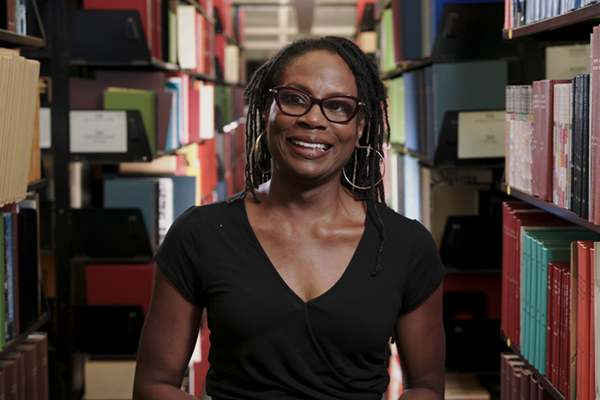Preserving the Rutgers-Newark Story for Future Generations
Angela Lawrence documents university’s impact as inaugural archivist at Rutgers–Newark

For decades, Rutgers University-Newark has been a fixture in the city’s cultural and intellectual life – a vibrant space where service, learning, and research all converge. Now, the record of this impact will be preserved for generations to come.
In her role as the inaugural archivist for the Rutgers-Newark Archives at John Cotton Dana Library, Angela Lawrence is tasked with collecting materials that accurately document, preserve, and communicate Rutgers-Newark’s historical record, highlighting the university’s role as an anchor institution in its host city.
Established earlier this year, the archive paints a rich portrait of Rutgers-Newark and its community, tracing the evolution of what was once a mostly white institution to one that is now nationally recognized for its commitment to diversity and inclusion.
“It’s pretty interesting because the scope of what has been collected over the years,” said Lawrence. “It was all over the map, and we want to focus the scope on the Newark story.”
In addition to decades of yearbooks, student publications, administrative proceedings, and other documents, the archives contains artwork, issues of the Rutgers-Newark Observer dating back to the 1930s, and even an atlas of the city of Newark from 1912. It also holds about 10 years of meeting minutes from the board of directors of the Newark Institute of Arts & Sciences, one of the four institutions that merged in 1936 to form the University of Newark, the predecessor to Rutgers-Newark as it is known today.
“It’s fascinating to be able to see what their vision was for the institution and how it reflects what we are now,” said Lawrence. “It’s like witnessing the birth of the university.”
Even in this early stage, the archives has already supported a variety of researchers, from students investigating the history of Dana Library’s architectural additions, to a political historian studying the student career of Senator Elizabeth Warren, who graduated from the Newark campus of Rutgers Law School in 1976.
“And this is only the beginning,” Lawrence explained. “We’re still working to document everything that’s currently in the collection, so that we can organize and describe it in a way that will be most useful to researchers in the future. We also want to focus on materials such as selected faculty papers, in order to better represent the breadth of scholarship conducted here.”
Moving forward, Lawrence also hopes to use the archives to help the library build new relationships with students, scholars, and local community groups.
“Whether it’s working with academic departments to introduce students to primary sources, or helping Newark residents explore the university’s relationship to the neighborhoods where they live, there are many opportunities in front of us,” she said.
Above all, Lawrence is excited by all the stories contained within the archive, just waiting to be told.
“The one thing about being an archivist is that we get to look at a lot of cool stuff, although we have to leave it to the historians to get really into the weeds,” Lawrence said. “Still, I find it so rewarding to know that my work will help others discover the history of Rutgers-Newark and how this institution has imprinted itself on the city, changing its landscape and activities.”
The Rutgers-Newark Archives are available for use by students, faculty, and the public on-site at John Cotton Dana Library. To schedule an appointment, contact archivist Angela Lawrence at angela.lawrence@rutgers.edu.